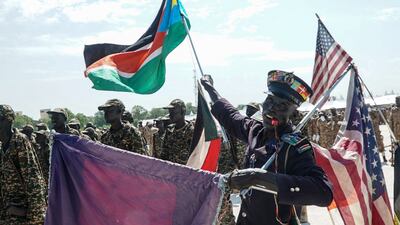Thousands of fighters including former rebels from rival camps in the civil war in South Sudan were integrated into the country's army in a long-overdue graduation ceremony on Tuesday.
The unification of forces loyal to President Salva Kiir and his rival, Vice President Riek Machar, was a key condition of the 2018 peace deal that ended the five-year conflict in which nearly 400,000 people died.
Since achieving independence from Sudan in 2011, the world's youngest nation has lurched from crisis to crisis, battling flooding, hunger, ethnic violence and political turmoil.
Nearly 22,000 men and women ― drawn from Mr Kiir and Mr Machar's parties as well as the South Sudan Opposition Alliance ― participated in Tuesday's proceedings, which were originally scheduled to take place in 2019 according to the peace deal.
But years of deadlock between the two men over the division of senior posts in the unified armed forces command meant that they signed an agreement on the issue only in April this year.
The delays have fuelled frustration in the international community as outbreaks of violence threaten to undo even fragile gains.
Thousands of former rebels swore an oath of loyalty in a ceremony held under tight security at Juba's John Garang Mausoleum ― built in honour of South Sudan's independence hero who died in 2005.
"From today you are not a military wing of any of the parties to the conflict," Mr Kiir told the uniformed graduates.
"Now you belong to the Republic of South Sudan and its people," he said before an audience that included diplomats and foreign dignitaries such as Ugandan President Yoweri Museveni and Sudanese coup leader Gen Abdel Fattah Al Burhan.
The ceremony came weeks after the country's leaders ― appointed to run a transitional government ― announced that they would remain in power two years beyond an agreed deadline, sparking international concern.
The transition period was meant to conclude with elections in December this year, but the government has so far failed to meet core provisions of the 2018 deal, including drafting a constitution.
In a speech at the Juba ceremony, Mr Machar urged those "whose confidence has been shaken by the slow implementation for this agreement ... to continue [to] support the implementation of this agreement".
Nicholas Haysom, the UN envoy to South Sudan, said he hoped the unified forces would "play a critical role in building democracy", with the country now expected to hold elections only in December 2024.
Another 30,000 forces were also expected to graduate in the coming days in training camps around the country, with Mr Kiir saying that flooding had made it difficult to reach some of the sites.
In addition to joining the army and the police, the new graduates have also been integrated into the VIP protection force, the wildlife service, the civil defence and other organisations responsible for national security.
The addition of tens of thousands of former rebels to the government's payroll will add to already crushing economic challenges ― civil servants have been unpaid for months.
But the move was nevertheless met with optimism in some quarters, with one former rebel telling AFP he was excited to join the police force.
"I am looking forward to serving my people. I just want to tell our people that finally peace has come after a long struggle," said the former rebel.
Many of the new graduates carried sticks instead of guns at the ceremony because of a years-long arms embargo imposed by the UN Security Council.
The government has repeatedly urged the United Nations to lift the embargo, even as deadly violence continues to affect the country.
"It is now high time for them to approve the purchase of the arms ... because these security forces cannot be security forces if they are not properly armed," Information Minister Michael Makuei told AFP.
The UN has regularly criticised South Sudan's leadership for its role in stoking violence, cracking down on political freedoms and plundering public coffers.
It has also accused the government of rights offences amounting to war crimes over deadly attacks in the south-west of the country last year.
The UN's World Food Programme said in March that more than 70 percent of South Sudan's 11 million people would face extreme hunger this year because of natural disasters and violence.
The United States last month pulled out of two peace process monitoring organisations in South Sudan because of the government's failure to meet reform milestones, citing a "lack of sustained progress".










